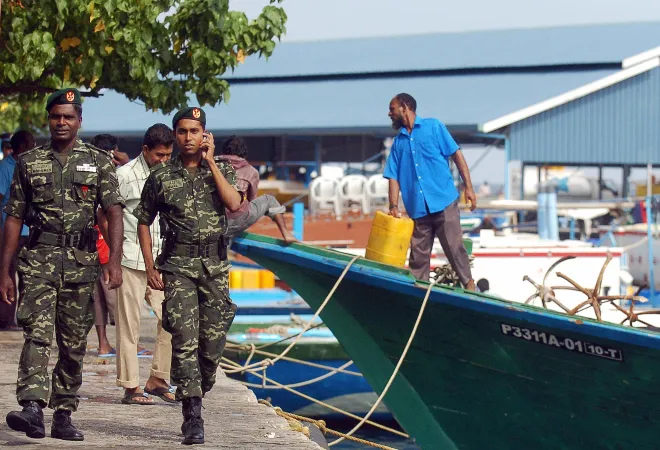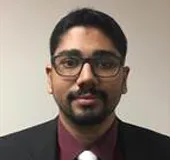
The attempted murder of the former Maldivian President and current Speaker Mohammed Nasheed has highlighted once again the challenges of extremism in the South Asian island nation. The Maldivian authorities have arrested 14 individuals in total, and as of May 29, the government has accused four individuals of planning a conspiracy to conduct terrorist attacks, supporting a foreign terrorist group, and recruiting individuals to partake in terrorist activity overseas.
The Home Affairs Minister, Imran Abdulla, has commented that there are numerous individuals in the islands who possess IED training, and the tiny nation has the unfortunate boast of being one of the countries with the highest per capita rates of jihadists who have left to fight in Iraq and Syria, all highlighting the depth and complexity of the violent Islamist threat that the Maldives faces. But at the same time, this threat background is not new, suggesting that a greater understanding is needed to understand the drivers of violence on the islands. Overreaction can be as dangerous as underreaction—calibrating that balance in the Maldives is going to be key.
A brief history of terrorism in the Maldives
Like much of the world, the Maldivian economy, which in ordinary times is reliant on tourism which contributes over 30 percent of GDP, has been depressed as a result of COVID-19. Coming out from the pandemic, it will need tourism numbers to pick up rapidly once again. But this beautiful tourist destination has also faced its fair share of terrorist complications. These date back to the war in Afghanistan and the jihad in Kashmir in the late 1990s, where individual Maldivians were found fighting alongside extremist organisations.
According to Maldivian specialists, there was a surge in the spread of extremist ideas in the wake of the 2004 Tsunami. In part, this was thanks to groups like Lashkar-e-Taiba taking advantage of the situation to establish a charitable foothold which then gave them an ability to recruit locally, but it was also thanks to the spread of a more exclusive form of Islam that flowed from different parts of the Muslim world. Saudi Arabia’s austere Salafi Islam, in particular, made its way to the nation giving the already disgruntled citizens a more intolerant religious ideology which mixed badly with the rampant corruption, poverty, and contrasting opulence reserved for tourists.
One result of this radicalisation was a bombing in 2007 that injured a group of mostly Chinese tourists at the Malé Sultan Park. This incident led to a crackdown on local Islamist networks, including the arrest of a number of preachers. After this, there was a reported silence in terms of incidents within the Maldives, though reports repeatedly emerged on Maldivians showing up in foreign battlefields or alongside other networks around the region.
Then in 2015, former President Abdullah Yameen was targeted in an explosion that took place on his boat; and in 2017 a prominent blogger, Yameen Rasheed, was stabbed to death near his home. Responsibility in both cases was unclear, with fingers being pointed at both extremists and political adversaries. In March 2020, a police boat was set on fire by Moosa Inaas, a man who was previously involved and jailed for the 2007 bombings.
New actors
Most worryingly, in 2020, there were stabbings of tourists; these incidents were claimed by Islamists with alleged links to the Islamic State in the nation, prompting further fear. This was in addition to some government-owned boats being set on fire (April 2020) in an incident that the ISIS claimed responsibility for.
The picture that is left is an opaque one. The attacks that have taken place appear to focus largely on politically connected figures or on tourists. While suspicions have repeatedly fallen on Islamists, it is not always clear that they are responsible. Since the establishment of the Islamic State in 2014, the country has been pushed into the spotlight. Evidence of this is seen in Sawt al-Hind’s (Voice of India) publications where this regional online propoganda magazine has been used to claim or laud attacks that have taken place in the Maldives.
The picture that is left is an opaque one. The attacks that have taken place appear to focus largely on politically connected figures or on tourists. While suspicions have repeatedly fallen on Islamists, it is not always clear that they are responsible.
But while there has yet been no clear claim of responsibility for the attack on Speaker Nasheed (ISIS has yet to comment on the incident at all), there is a clear and growing concern around the threat from ISIS or al-Qaeda-inspired extremists. The government accuses the four men who were allegedly involved in the attack on Speaker Nasheed of supporting and recruiting people for overseas terrorist groups in the name of ‘jihad’; it is more than likely that their assessments point to one of the two.
In the aftermath of this bombing, Maldivian Home Affairs Minister Imran Abdulla also noted that over 1,400 extremists were living freely in the Maldives, and some of them had improvised explosive device training. He used this opportunity to call for greater legal powers to detain and rehabilitate extremists.
Uncomfortable questions (and answers)
The bigger problem that the incident casts a light on is the continuing lack of any clear plan in the Maldives about how to address the still lingering question of radicalisation amongst some members of the island’s community. The Home Affairs Minister’s reference to the 1,400 extremists is a worrying set of statistics for a security force which is apparently struggling to provide tight security to one of its most senior politicians. Authorities appear to be willing to repatriate individuals who fought in Syria and Iraq, but it is not clear if there are processes in place to manage their effective de-radicalisation.
The bigger problem that the incident casts a light on is the continuing lack of any clear plan in the Maldives about how to address the still lingering question of radicalisation amongst some members of the island’s community
In January this year, authorities released a 34-year-old man who had been brought back from Syria the year before with police saying they would merely continue to monitor him. This follows a pattern in which police reportedly undertake arrests and disrupts plots, but infrequently appear to follow up with trials. Moosa Inaas’s case demonstrates the weaknesses in the processes to de-radicalise terrorist convicts.
But in a similar way, the government appears to be struggling on how to manage this threat—a threat they do not fully comprehend. The ISIS has passed comments about a few incidents in the Maldives, but it is not clear as to why they are not claiming the others. Given the large number of per capita extremists in the islands, the rich number of potential targets in the forms of foreign tourists, the tensions that exist between conservative Muslims on the islands and some of these tourists, and finally the questionable capability of the security force, it is surprising in some ways that more attacks have not been seen.
This highlights an uncomfortable conclusion that has to be explored in the Maldivian context. While it is probable that more incidents are likely to take place, care needs to be taken to not overstate and overreact. There is clearly an intangible balance that exists within the Maldives that has so far kept an explosive situation to a limited (and highly targeted) set of incidents. Understanding this complicated balance is essential before a large-scale counter-extremism and counter-terrorism programming is deployed. Otherwise, a spark might set off something far worse.
The views expressed above belong to the author(s). ORF research and analyses now available on Telegram! Click here to access our curated content — blogs, longforms and interviews.




 PREV
PREV


